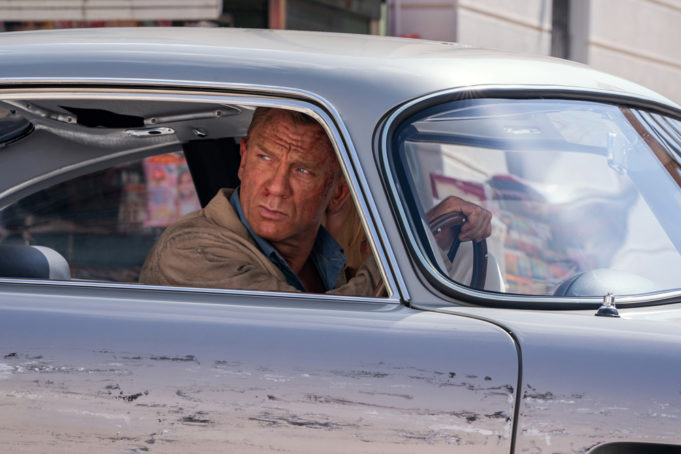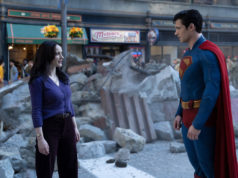So, I jumped the gun six years ago when I reviewed Spectre and said it was Daniel Craig’s last go-round as James Bond. God help me, it felt that way back then, but the force of a very large paycheck and whatever else were brought to bear to squeeze one more film out of him. That movie, called No Time to Die, was supposed to come out in April 2020 before being delayed numerous times by the pandemic. Having finally seen it, I can say unambiguously that this is his last performance as the secret agent, and despite some significant issues, it’s an appropriate farewell to the actor, one that’s almost worth sitting through the theatrical trailer 647 times for.
The film begins with two prologues, one set in 2016, when James is enjoying his retirement in Italy with Madeleine Swann (Léa Seydoux), who suggests he visit Vesper Lynd’s nearby grave, but he finds an ambush waiting for him there. Afterward, he finds a congratulatory call from Blofeld (Christoph Waltz) on Madeleine’s phone and vows she’ll never see him again. Five years later, Bond is not enjoying his retirement in the Caribbean when he receives a call from CIA pal Felix Leiter (Jeffrey Wright) requesting his help rescuing a Russian biologist (David Dencik) whom SPECTRE has captured from an MI6 facility. Bond finds the new Agent 007 (Lashana Lynch) already on the man’s trail and warns her that something’s off if British and American intelligence aren’t working together. He’s right, because the scientist betrays everyone and creates a bloodbath with his new biological weapon before handing it over to a facially scarred Russian baddie named Safin (Rami Malek). Now Bond has to team with Blofeld, who’s one of Safin’s enemies, and Madeleine, who’s Blofeld’s psychotherapist.
This is the first-ever James Bond film with a non-British director. Cary Joji Fukunaga, the Japanese-American behind Jane Eyre and TV’s True Detective, delivers large-scale set pieces like the series’ fans want, though I find him better when he’s tackling the smaller action sequences like a car chase through a Norwegian forest when Bond is stranded and uses the fog to set traps for his enemies or the other prelude that reveals Madeleine’s childhood to be more traumatic than we imagined.
Besides Fukunaga, Phoebe Waller-Bridge of TV’s Fleabag and Killing Eve has joined as a screenwriter. When a film has four credited writers, it’s usually hard to tell who wrote what. Nevertheless, her fingerprints are all over the scene when Bond interrogates Blofeld in max-security prison — the ex-supervillain is bound hand and foot in a rickety metal cage, and he’s still able to torture Bond by taunting him about Madeleine. (Here, belatedly, Waltz comes good in this part.) There’s a greater emphasis on psychological depth, as Safin links his own childhood trauma with both Bond’s and Madeleine’s and wonders whether heavily damaged people are drawn to their work. Bombshell revelations come thick and fast about Bond and many other characters.
This gives the actors something to play, although Malek’s icy, whispered performance eventually grows monotonous. Ana de Armas, limited to a glorified cameo as a Cuban CIA contact, still makes a bright impression as a newly minted agent who’s a bit too excited about her job. (If you’ve only seen her as the nurse opposite Craig in Knives Out, this glamorous role is much more typical of what she usually plays.) Lynch, last seen playing a Louisianan Air Force pilot in Captain Marvel, is another good pickup for the series, handling the fight sequences, outfits, and different accents in high style.
This 163-minute film has far too much fat and fanservice as it tries to work in all its characters. The sentimentality grows overbearing at times in the later scenes between James and Madeleine, yet I find it worth sitting through for the few new notes that Craig finds in playing Bond as a man who’s good at his job because he’s broken inside, particularly in a speech to Madeleine when he faces his history of not trusting other people. As Bond ensures that Safin’s poison does not infect the world or the people he cares about, No Time to Die ends on a beat that the Bond movies have always avoided but is wholly logical. One reason the series has lasted this long has been its willingness to evolve. A stage of evolution closes here, and it feels satisfying.
No Time to Die
Starring Daniel Craig and Rami Malek. Directed by Cary Joji Fukunaga. Written by Neal Purvis, Robert Wade, Cary Joji Fukunaga, and Phoebe Waller-Bridge.
Rated PG-13.












